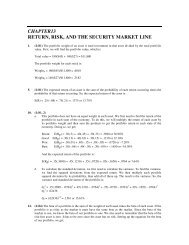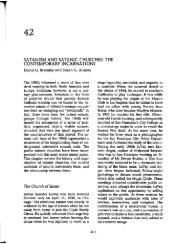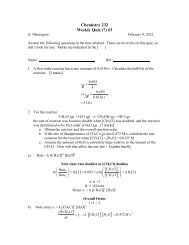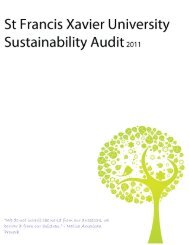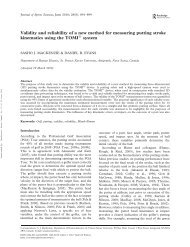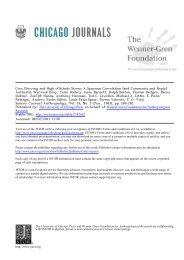ÉTIENNE GILSON AND THE ACTUS ESSENDI
ÉTIENNE GILSON AND THE ACTUS ESSENDI
ÉTIENNE GILSON AND THE ACTUS ESSENDI
You also want an ePaper? Increase the reach of your titles
YUMPU automatically turns print PDFs into web optimized ePapers that Google loves.
Dewan: Gilson and the actus essendi<br />
Gilson’s conception of the via remotionis in ST 1.3 is wrong. Thomas is not<br />
eliminating essence from God. He is eliminating composition, and thus coming<br />
to the identity of essence and esse (and concrete thing, as well). 15<br />
In still further reflection, Gilson feels the need to bring in essence somehow.<br />
We read:<br />
[Thomas’s] own formulation of the conclusion is significant. Before Thomas<br />
Aquinas, Avicenna had bluntly said that the First has no quiddity: Primus igitur non<br />
habet quidditatem. 16 Thomas himself seems to have avoided this uncompromising<br />
language. 17 Not that he had any objection to the truth of what it says, for if essence<br />
is understood as something in any way different from God’s act of being, then it must<br />
be conceded that God has no essence. But Thomas Aquinas does not want us, or<br />
himself, to lose contact with the quiddity of sensible things, our necessary starting<br />
point for investigating the nature of God. To know something is for us to know what<br />
it is. If God has no essence, He has no “whatness,” so that to the question: What is<br />
God? the correct answer should be, nothing. Many mystics have not hesitated to say<br />
so, in the definite sense that God is no-thing, but they certainly were not doubting<br />
God’s existence. To say that God has no essence would be to render Him completely<br />
unthinkable. (133)<br />
Here, one wants to know whether the reasons for sticking with essence have to<br />
do merely with our mode of knowing. Would God still know himself, or does<br />
he have some better mode of being than that? Is he, in a Neoplatonic mode,<br />
beyond knowability? 18<br />
15 SCG 4.11 (ed. Pera #3472-3473) is a passage from St. Thomas which shows something<br />
of the variety of intelligible roles of the various items in the metaphysical analysis:<br />
... it has been shown in the First Book (ch. 31) that those things which in creatures<br />
are divided are unqualifiedly one in God: thus, for example, in the creature essence<br />
and being [esse] are other; and in some [creatures] that which subsists in its own<br />
essence is also other than its essence or nature: for this man is not his own humanity<br />
nor his being [esse]; but God is his essence and his being.<br />
And though these in God are one in the truest way, nevertheless in God there is<br />
whatever pertains to the intelligible role [ratio] of the subsisting thing, or of the<br />
essence, or of the being [esse]; for it belongs to him not to be in another, inasmuch<br />
as he is subsisting; to be a what [esse quid], inasmuch as he is essence; and being in<br />
act [esse in actu], by reason of being itself [ipsius esse].<br />
16 Gilson gives us no reference at this point, having earlier relied upon a reference to Fr.<br />
Armand Maurer’s translation with notes of the De ente et essentia (ECP, p. 305, n.28).<br />
In Liber de prima philosophia (ed. S. Van Riet, Louvain/Leiden: Peeters/Brill, 1997),<br />
see 8.4 (p. 402, lines 44-62). There Avicenna says several times that the first does not “have<br />
a quiddity.” On p. 398, line 67 and following, Avicenna speaks frequently of the “essentia”<br />
of the first. And at line 83-84 (pp. 398-399), he says that the first has no quiddity SAVE<br />
anitas, i.e. esse (according to S. Van Riet’s note, ad loc.).<br />
17 This is a howler. Thomas, as we have seen, even in the very Avicennian De ente, says<br />
that essence is found most truly in God.<br />
18 See ample references in John N. Deck, Nature, Contemplation, and the One: A Study in<br />
75


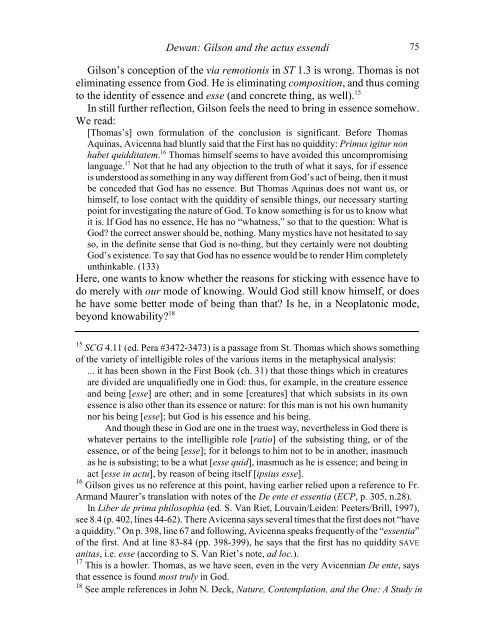
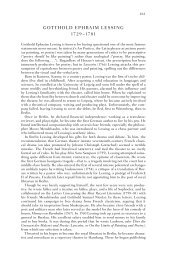
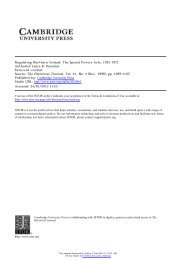
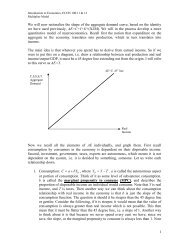
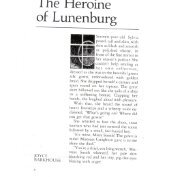
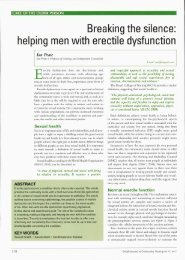
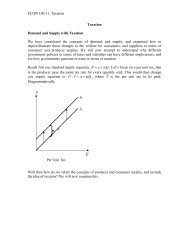
![The Rink - Cyril Dabydeen[1].pdf](https://img.yumpu.com/21946808/1/155x260/the-rink-cyril-dabydeen1pdf.jpg?quality=85)

